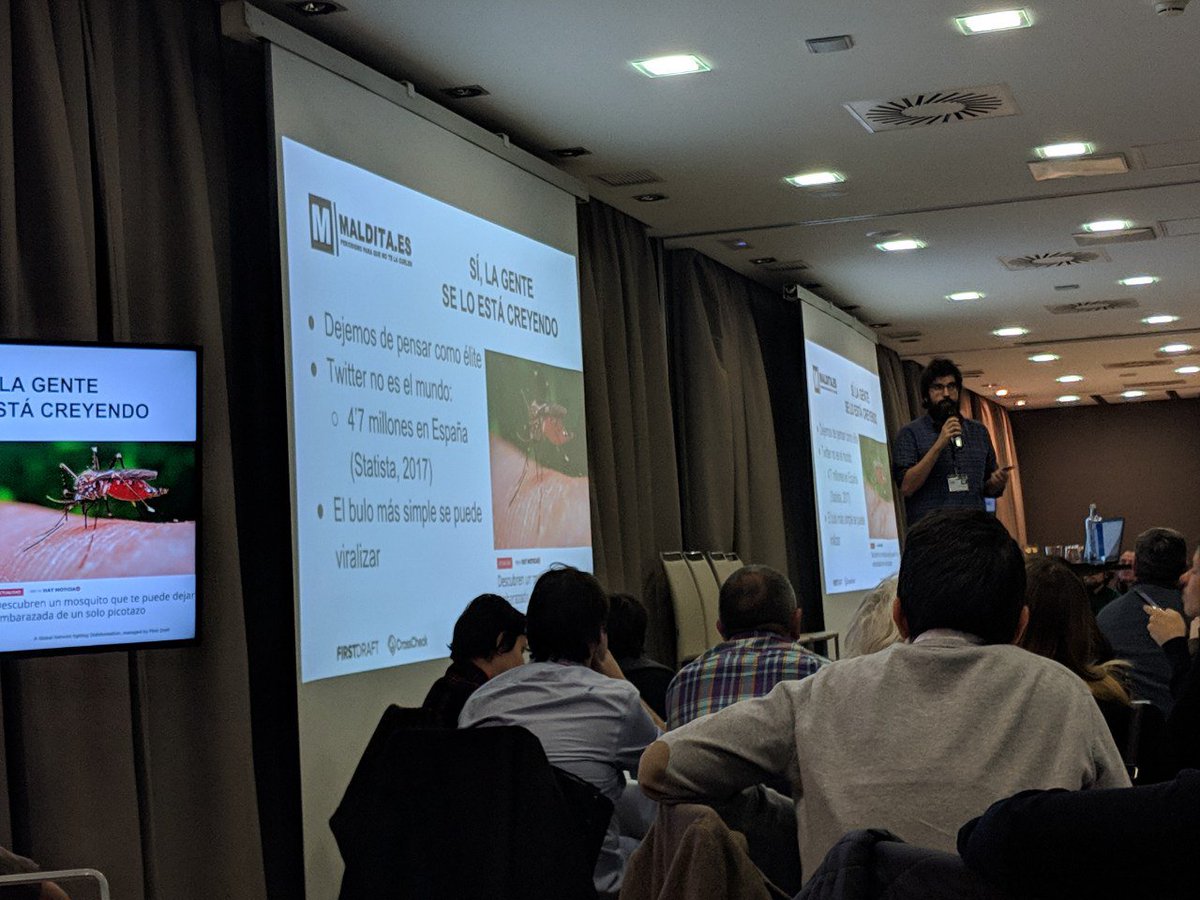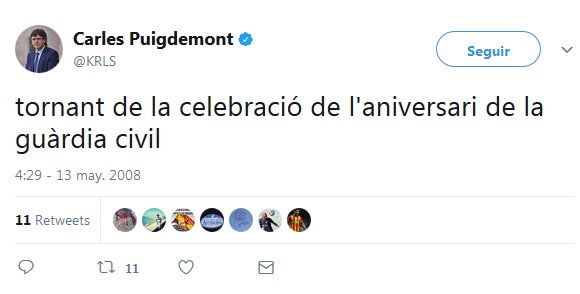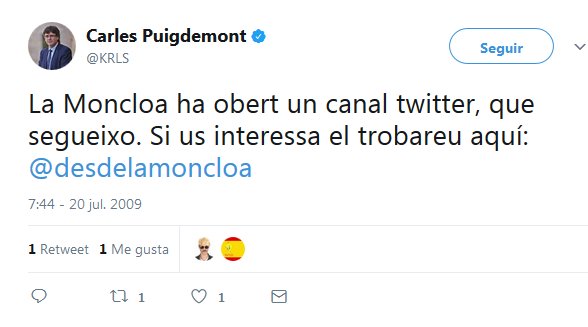
1.1 - #VerifyIn21Tweets STARTS NOW! One week, 21 tweets and a challenge: testing your verification skills. At @maldita_es we are fact-checkers: we debunk hoaxes with data, facts and scientific knowledge. In this course we are going to provide you with “tools to not be fooled” ⬇️ 

1.2 - WHY DO PEOPLE DISINFORM? Sometimes to obtain economic profit or to influence the ideological battle, although it can simply be for pure evilness, as we explain in the photo. And you? What type of misinformer do you encounter more often? Reply to our tweet! #VerifyIn21Tweets 

1.3 - Yes, disinformation has many formats and intentions, but those who share it are not the enemy. You are much more capable of debunking the lies shared by your loved ones than we are.
Don’t forget: Before 🔃→Stop✋Think🤔Verify🧐
#VerifyIn21Tweets
Don’t forget: Before 🔃→Stop✋Think🤔Verify🧐
#VerifyIn21Tweets
2.1 - DO YOU KNOW HOW TO SPOT A FAKE TWEET? Start by checking if it’s a link or a screenshot. 🧐 If it’s a link and it takes us to Twitter, it’s a real one (beware of false accounts, though!). If there’s no link, it’s time to verify 👇
#VerifyIn21Tweets
#VerifyIn21Tweets

2.2 - It seems easy, right? Let’s find out. Your uncle Bob has shared this picture of a tweet. Is it real? 🤔 DID MARY TRUMP REALLY WRITE THAT? Try to work it out and verify…
🕘 Results at 10 p.m.! 👇
#VerifyIn21TWeets
🕘 Results at 10 p.m.! 👇
#VerifyIn21TWeets

2.3 - IT’S FALSE ❌❌❌ The account doesn’t belong to Mary Trump, it’s a parody account: @unRealMaryTrump. There are many ways to falsify a tweet. Suspect if it’s a screenshot and there’s no link. More examples of fake tweets ⬇️ #VerifyIn21Tweets 







3.1 - IMAGE VERIFICATION 👀 Start by observing: notice every detail that can give you a clue on WHEN and WHERE the picture was taken. An easy way of getting information about a picture is by doing an image reverse search 📺
How to do it: #VerifyIn21Tweets
How to do it: #VerifyIn21Tweets

3.2 - You receive on WhatsApp the picture 📸 on the former tweet. ☝️ You already know how to check if the photo is real. 🤔
So, answer us: DO YOU THINK THAT PRINCE WILLIAM REALLY MADE THIS GESTURE? 👑😬 ⬇️
#VerifyIn21Tweets
So, answer us: DO YOU THINK THAT PRINCE WILLIAM REALLY MADE THIS GESTURE? 👑😬 ⬇️
#VerifyIn21Tweets
3.3 - MOST OF YOU WERE RIGHT! Perspective can be deceiving: with the reverse image search we can see the context of pictures. Click on the camera in the Google Images search bar and upload a photo. Within seconds we can see that William didn’t do that gesture #VerifyIn21Tweets⬇️ 

4.1 - CAREFUL WITH SCAMS! 🤬 False content sometimes has one goal: steal your data and money. Have you ever received a great deal of a very well known brand that is simply too good to be true? Suspect! 🤔 It could be phishing! 🎣🎣🎣
#VerifyIn21Tweets ⬇️
#VerifyIn21Tweets ⬇️

4.2 - How can we identify phishing scams? Look closely at these two emails. 📧
WHICH ONE DO YOU THINK IS FAKE?
RT 🔃 TD Bank
FAV♥️ Barklays
RT 🔃+FAV♥️ Both
Also reply to this tweet explaining why you think they are real or false ⬇️ #VerifyIn21Tweets
WHICH ONE DO YOU THINK IS FAKE?
RT 🔃 TD Bank
FAV♥️ Barklays
RT 🔃+FAV♥️ Both
Also reply to this tweet explaining why you think they are real or false ⬇️ #VerifyIn21Tweets

4.3 - Well..., BOTH ARE A SCAM! The one from TD Bank has a ".doc" file to download, something that your bank would never do. The Barclays one is better made and harder to spot, but it doesn't address you by your name.
Down here some clues from @Europol 👮♀️ ⬇️
#VerifyIn21Tweets
Down here some clues from @Europol 👮♀️ ⬇️
#VerifyIn21Tweets

5.1. - DO YOU KNOW THAT YOUR BRAIN TRICKS YOU? Have you noticed that we don’t all think the same way about one same event? Biases shape the way we see the world 🌏 The brain uses shortcuts to quickly process information and to simplify decision-making. 🤯
#VerifyIn21Tweets
#VerifyIn21Tweets
5.2 - We know that our brain can fool us, but there are strategies that can prevent it. Have a look at his video from @KQEDedspace on how to think critically and question the information you receive.
HAS YOUR BRAIN EVER DECEIVED YOU? Write here how! ⬇️
HAS YOUR BRAIN EVER DECEIVED YOU? Write here how! ⬇️
5.3 - Combating our own biases isn’t easy, so we might not be as rational as we think. 🤷♀️ That’s why it’s good to question the information we receive. Here are some techniques to avoid being fooled by your own brain 🧠 ⬇️
#VerifyIn21Tweets
#VerifyIn21Tweets

6.1 - BEWARE OF PEOPLE WHO ARE TOO POLARIZED, debating with them will just frustrate us 🤦♀️ In a short term we will not be able to change people’s beliefs. We’ve got to be patient and, if it’s the case, explain why we disagree with these theories
#VerifyIn21Tweets
#VerifyIn21Tweets

6.2 - We now know how to identify disinformation and we can help stopping the distribution of hoaxes, but how do you tell loved ones that they have shared disinformation? 😧 WHAT SHOULD YOU DO IF A FRIEND OR FAMILY MEMBER SHARES A CONSPIRACY THEORY ON TWITTER?
#VerifyIn21Tweets
#VerifyIn21Tweets
6.3 - WELL DONE! 👏 It’s best to have that conversation in private so that these people aren’t publicly shamed. When a friend shares a hoax with us it’s likely that they aren’t doing it with a bad intention 📺 Look at how polarization has shaped politics
7.1 - FINAL DAY, FOLKS! We’ve learnt basic notions about disinformation, such as identifying hoaxes and avoiding scams. Check this toolbox designed to help simplifying and streamlining verification for beginners from @firstdraft 📲 bit.ly/3t2wNr7
#VerifyIn21Tweets
#VerifyIn21Tweets

7.2 - Lots of hoaxes are created on anonymous sites 🕵️ and they need your ‘click’ to become viral. If you can’t spend time to verify it, do not share! 🙅♀️ That’s how we can stop the amplification of hoaxes. Any questions about the course? Q&A time at 9 p.m.! ⬇️
#VerifyIn21Tweets
#VerifyIn21Tweets

7.3 - The best vaccine 💉 against lies 🦠 is critical thinking and civic education on managing information. It’s a process that will take time, so until then fact-checking journalism alongside the help of the community is key to stop hoaxes.
Any question?
#VerifyIn21Tweets
Any question?
#VerifyIn21Tweets
Thank you for coming this far. 🤗 We hope we have offered you some of the keys to defend yourself in the era of disinformation. At educa.maldita.es you can find all the resources we have at Maldita
And remember: IF YOU DOUBT, DON’T SHARE!
#VerifyIn21Tweets
And remember: IF YOU DOUBT, DON’T SHARE!
#VerifyIn21Tweets
• • •
Missing some Tweet in this thread? You can try to
force a refresh





